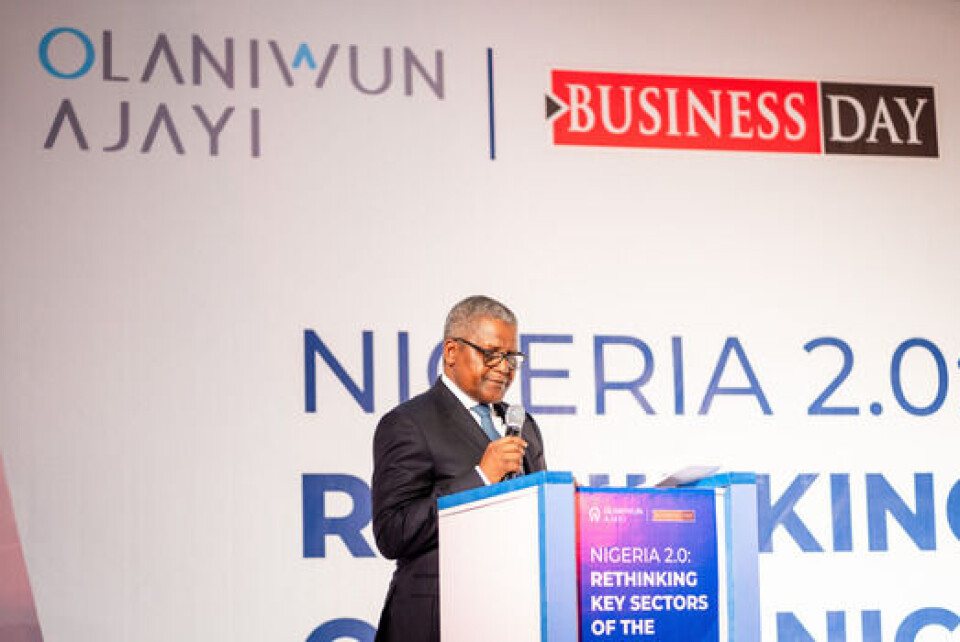As part of the ongoing public debate on Nigeria’s energy transition, Olaniwun Ajayi LP (OALP) and Business Day organised the summit which focused on rethinking key sectors of the Nigerian economy. Entrepreneurs, investors and regulators present at the event concluded that the first step should be financing.
In his opening remarks, Tominiyi Owolabi, Managing Partner at OALP, stressed that the business summit was organised to set an agenda for the new government and chart a course towards a better Nigeria.
Aliko Dangote, MFR, GCON, Chairman and CEO of the Dangote Group and Africa’s richest man, used his keynote speech to set the tone for the conversations, pointing out the country’s dependence on oil and low investment in gas. “Gas infrastructure financing should be prioritised above rail projects as it is cheaper,” he commented. He also noted that “the power sector is a key enabler of our economic growth”, and “any government that resolves the issues in the power sector would not need to campaign for a second term”.
Dangote emphasised that investment in the gas sector can propel economic growth if harnessed for petrochemical production, power generation and other gas-based industries. “To accomplish this goal, about 20 million tonnes of production capacity needs to be constructed. It will require a huge volume of gas, but not up to liquefied natural gas,” he said.
Taking the discussion a step further, other panellists also spotlighted the potential of this investment as a way to encourage Nigeria’s transition from fossil fuel to renewable energy.
Akin Akinfemwa, CEO of Geregu Power Plc, emphasised the need to strike a balance between gas and renewable energy. “We must maximise and exhaust all the hydrocarbon resources at our disposal. That will give us a quick route to achieving our energy objectives as a nation,” he said. “One thing we need to focus on is energy security and affordability. We need a quick route to achieve this. Everyday, we keep flaring millions of cubic feet of gas.”
Deputy Director at Africa Finance Corporation, Fola Fagbule, explained his organisation’s commitment to the energy transition across African countries and advised stakeholders to focus on getting Nigeria out of its energy poverty. “We have only 10 million grid-connected customers in Nigeria. That's ridiculous,” he noted. Nigeria’s population is currently estimated to number 224 million.
In the panel session moderated by Folashade Oluyadi, a partner at OALP, Abel Nsa explained how the government is trying to navigate its way through these challenges around investing in the oil and gas sector and Nigeria’s energy transition goals, by tweaking regulations and restoring investors' confidence.
Nsa, head of the National Oil and Gas Excellence Centre, a department of the Nigerian Upstream Regulatory Commission, stated that the agency is also empowered to regulate the commercial side of the oil and gas sector.
“There is a dearth of infrastructure, so innovative ways are coming in. We are tweaking the regulatory tools to take out the bottlenecks. There is competition now in Africa if you are looking all round, and we are navigating those minefields with whatever we have,” he said.
During the summit, OALP took delight in launching their Ohada Practice headquartered in Douala, Cameroon, through OA Africa SCP, a member of the Olaniwun Ajayi Group. This is a major step towards creating a truly African law firm.
The firm also used the summit to launch two books which were unveiled by Jim Ovia MFR, CON, the Chairman of Zenith Bank. Disruptions and the Law was inspired by the need to examine the current state of Nigerian law and policy in responding to disruptions, and to recommend plausible and futuristic solutions. Competition Law in Nigeria examines the underpinnings of competition law and policy as means to achieving economic development. The books will be useful tools for anyone who desires a deeper understanding of the Nigerian market.
Generally, the summit fostered dialogue, generated ideas and inspired collective action towards rethinking and reshaping key sectors of the Nigerian economy, with a specific focus on infrastructure, power and oil & gas.
To join Africa Legal's mailing list please click here

